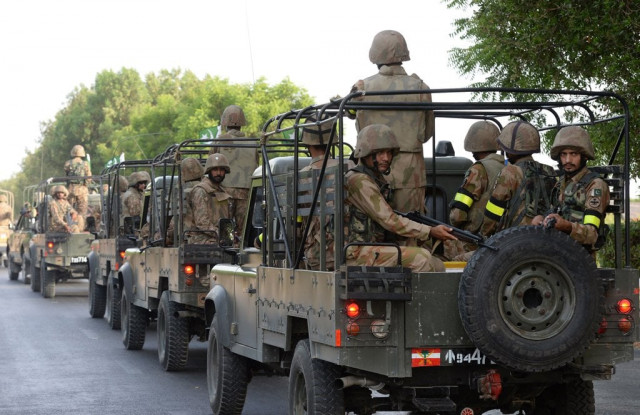Army gets judicial powers for census
Army men to hand down punishment to non-cooperative citizens

Say they support 'Operation Radd-ul-Fassad' against extremism and terrorism. PHOTO: AFP
“The ministry has approved a summary to give judicial powers to the military personnel supervising the national headcount exercise,” an official of the Pakistan Bureau of Statistics (PBS), the body responsible for holding the census, said on Tuesday.
Headcount in FATA faces legal challenge
According to the PBS Census and Survey Member Habibullah Khan, the bureau had sought these powers for its enumerators to ensure speedy dispensation of justice. “The law already provides for giving punishment but the PBS wanted that the judgments should be given on spot to compel the people to cooperate and remain truthful,” he added.
According to the law, those who refuse to participate in the national headcount or give false information will be liable to a 50,000-rupee fine and a six-month jail term.
The first phase of the 6th population census, covering 63 districts in four provinces and special areas, will begin today with house listing and will be completed in two phases by May 25.
The first phase of house listing will end on March 17, after which census forms — tagged as Form-2 — will be filled from March 18 to March 27. Homeless people will be counted on March 28. All the provincial capitals are part of the first phase. Two days — March 29 and March 30 — have been reserved for retrieval of the filled-out forms. The summary results of the census, comprising district-wise population details, urban-rural population and male-female ratio will be ready by July 25. Initial results will be released by August 5.
Districts to be covered in the first phase are Karachi West, Karachi South, Karachi East, Korangi, Karachi Central, Malir, Hyderabad and Ghotki in Sindh; Quetta, Pishin, Musa Khel, Lehri, Kohlu, Dera Bugti, Jaffarabad, Nasirabad, Kalat, Awaran, Kharan, Washuk, Lesbela, Kech/Turbat and Nushki in Balochistan.
Peshawar, Mardan, Swabi, Charsadda, Nowshera, Lakki Marwat, DI Khan, Hangu, Abbotabad, Haripur, Mansehra in Khyber-Pakhtunkhwa (K-P) as well as Orakzai Agency in the Federally Administered Tribal Areas (Fata) are included in the first phase.
5 things you need to know about Pakistan's first census in 19 years
The census will start from Jhang, Chiniot, Faisalabad, Toba Tek Singh, DG Khan, Rajanpur, Layyah, Muzzafargarh, Lahore, Hafizabad, Narowal, Sialkot, Vehari and Bahawalpur districts in Punjab; and Muzaffarabad, Bagh, Sudhnoti, Kotli and Bhimber in Azad Jammu and Kashmir (AJK).
The PBS has divided the country into over 168,275 census blocks. Each block consists of 250 to 300 houses, to be covered by a civilian enumerator who will be accompanied by a military man.
The Pakistan Army has taken the responsibility of providing security through its 200,000-strong force. About 42,000 personnel will perform the role of enumerators while the rest will provide security.
Having a Computerised National Identity Card (CNIC) is not compulsory for one to be counted during the census. Every living soul in Pakistan will be counted on March 18. The maximum age limit for counting people is 85 years.
The exercise is taking place after a delay of nine years, as the last population census was conducted in 1998. The data obtained through the largest-ever exercise will be used for distribution of the National Assembly seats and division of financial resources as over 82% of federal taxes are given on the basis of population. The population is also the base for distribution of civil service jobs among the provinces.
The smaller provinces hope of gaining some grounds due to expected increase in their population, although the Punjab’s position of a big brother would not be largely affected.
At the same time, there are fears among the Temporarily Displaced Persons (TDPs) of being left out and the Baloch nationalists of facing a demographic imbalance in Balochistan due to possible counting of Afghans as Pakhtuns.
Last month, Senator Saleh Shah, who has been elected from Fata, said that the TDPs from three out of the five tehsils of South Waziristan Agency have not returned to their homes due to lack of community infrastructure. The Inter-Service Public Relations (ISPR) on Monday said about 89% of the TDPs have returned to their homes.
“Still, there is no mechanism to count those TDPs, who are not residing at their permanent addresses. Till Tuesday, we have not received any information from Fata Secretariat about how to treat the TDPs,” said Habibullah. “In absence of any special arrangement, the TDPs will be counted where they are currently living,” he added.
The Fata Secretariat’s official response to the PBS was that there were no TDPs in the country after December 31, 2016. There was also a concern about the authenticity of census data in absence of post-enumeration. But the PBS official said the post-enumeration survey was not carried out even in 1998.
Published in The Express Tribune, March 15th, 2017.



















COMMENTS
Comments are moderated and generally will be posted if they are on-topic and not abusive.
For more information, please see our Comments FAQ